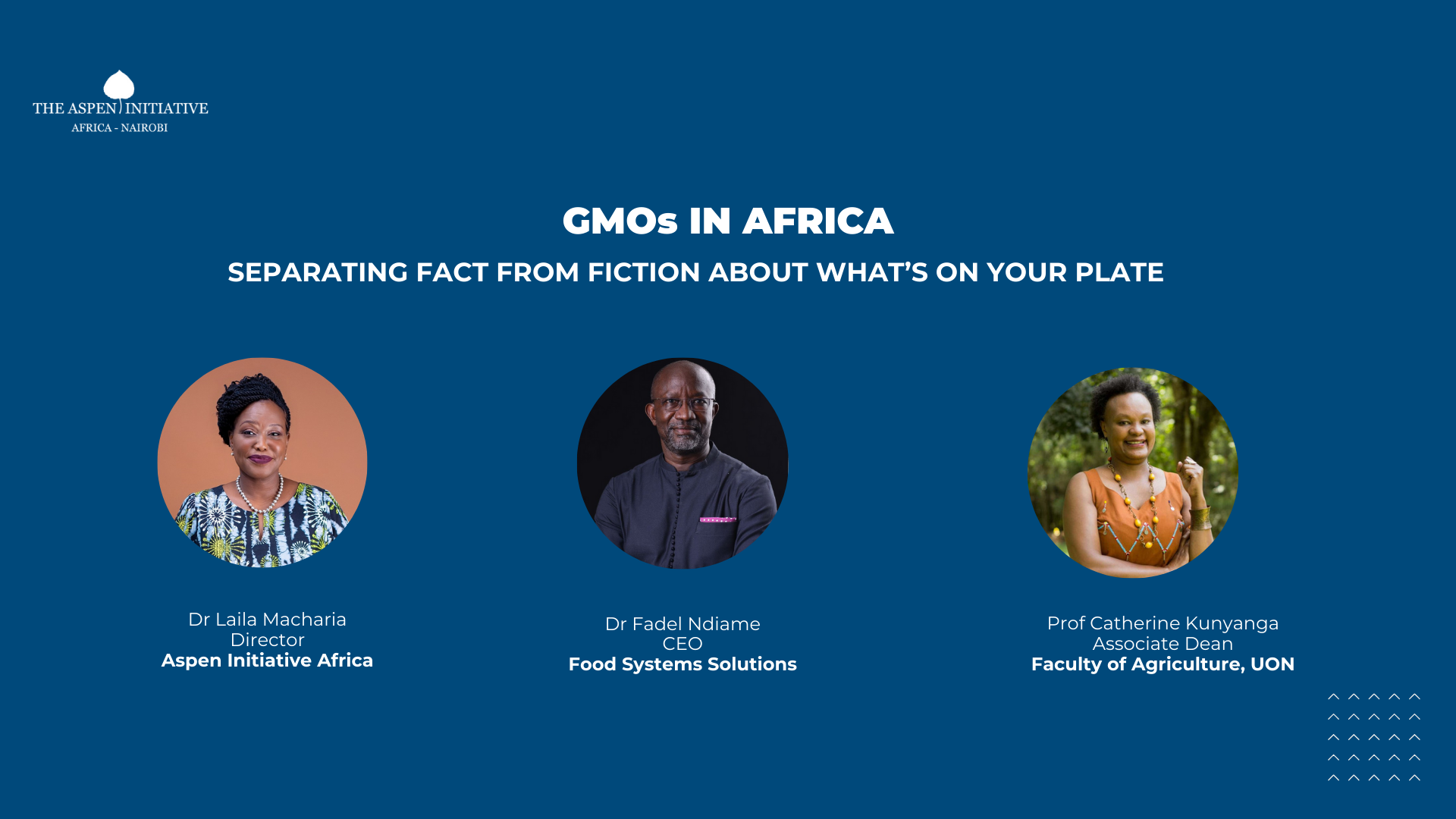
The topic of Genetically Modified Organisms (GMOs) sparks considerable debate.
Scientists, experts, and the general public are divided on the issue, with some asserting that GMOs have the potential to alleviate world hunger, poverty, and the environmental impact of agriculture, particularly in developing countries
In Africa, one in five people faces hunger or malnutrition. According to FAO, 6.5 M people In South Sudan suffer from acute food insecurity. 65% of the population in Burundi and 44% of the population in Eritrea is affected by food insecurity.
Many may not have the option to choose between potentially unhealthy food and the life-threatening consequences of hunger.
Therefore a conversation about food availability is critical and GM technology can help African farmers to produce sufficient and high-quality food.
On the opposing side of the debate are critics of GM technology who contend that it may have adverse effects on human health, the environment, and the economy.
Aspen Initiative Africa is fostering authentic and meaningful dialogue. AIA held a webinar to give a clearer sense of the issues and arguments that surround GMOs. Prof. Catherine Kunyanga, Dr Fadel Ndiame and Mucai Kunyiha joined the panel moderated by Dr Laila Macharia.
What Is GMO?
A GMO is a living organism whose DNA has been manipulated by genetic engineering to acquire desirable traits such as pest resistance, flavour improvement or higher nutritional content. While selective breeding may allow for food to acquire these properties naturally, it may take many generations.
GM technology accelerates this process often leading to better yield. Generating insect and disease-resistant plants decreases the application of pesticides and fertilisers contributing to a healthy and more sustainable environment.
What Is the Difference Between GMOs and Transgenics?
A transgenic is an organism or cell whose genetic makeup has been modified through the introduction of one or more foreign DNA sequences from another species through artificial methods.
New treatments have been developed by using transgenic animals to replicate human diseases. Similarly, scientists have utilized transgenic techniques to produce insulin for individuals with diabetes and engineer crop varieties resistant to diseases.
What Is the Difference Between GMO and Organic?
Genetic engineering is prohibited in organic products. Organic foods are free of any harmful chemicals, synthetic herbicides, pesticides, antibiotics, drug residues and neurotoxins.
Regulatory agencies play a crucial role in ensuring that organic foods are appropriately labelled, allowing consumers to distinguish between genetically modified (GM) and organic products.
In contrast to GMOs, organic products typically carry a higher price in the market, attributed to increased maintenance costs and lower yields.
Is it Likely That I Have GMOs in My Kitchen?
Currently, nearly 10 genetically modified (GM) foods are being cultivated and consumed worldwide including soybean, corn, rice, potatoes, papaya, beets, canola oil, and tomatoes:
GM maize is being grown in European countries such as Spain, Portugal, the Czech Republic, Slovakia, and Romania.
USA grows corn and soya bean, cotton, papaya, summer squash and alfalfa
Africa grows cotton in South Africa and Burkina Faso as well as maize in South Africa and Egypt
In addition cotton, maize, cassava, cowpeas, sorghum, potatoes, banana, sweet potatoes, sugarcane, coconut, grapes and squash are being grown in African countries under research and testing.
The lack of sufficient data on the prevalence of genetically modified (GM) foods in Africa makes it challenging to determine whether GMOs are present in your kitchen.
However, we can draw observations from the food sector, particularly as we import foods through weak border controls.
Poor monitoring and regulations coupled with the rise of foreign food outlets such as fast-food joints, contribute to a higher likelihood of consuming genetically modified (GM) products.
This overlooks the significant impact of soy, as approximately 70% of the world’s soy production is genetically modified. Soy is widely favoured among farmers, who use it as feed for their poultry and cattle.
Certainly, what we can confirm is that certain African countries are cultivating genetically modified (GM) foods, and ongoing research is being conducted to determine what can be introduced into the market for widespread consumption.
Due to the nature of the global economy, it is difficult to insulate ourselves from this trend.
Considerable global research has been conducted, and there is no compelling evidence suggesting that genetically modified (GM) food is inherently more dangerous or poses greater hazards than conventionally grown food.
Yet, it’s crucial to recognize specific concerns, and it’s worth noting that there are accompanying legislations governing the production and commercialisation of GMOs.
The Cartagena Protocol on Biosafety is a global agreement to ensure the safe handling, transportation, and utilization of living modified organisms (LMOs) produced through modern biotechnology.
Its focus is on preventing adverse effects on biological diversity while also addressing potential risks to human health. 49 of the 170 countries that have subscribed to those conventions.
The convention outlines precise policy and regulatory measures, forming the framework for the research and production of GMOs. South Africa has robust legislative measures in place while countries like Egypt, Kenya, Nigeria, Senegal and Burkina Faso are setting in place the legislative framework that enables them to explore that technology.
In Kenya, the National Biosafety Authority is tasked with regulating research and commercial activities related to GMOs to ensure the safety of human and animal health, as well as to provide an adequate level of protection for the environment.
However, citizens are expressing concerns about the authority’s capacity to fulfil its mandate before allowing production and consumption in our local markets.
Some scientists and researchers are expressing reservations about the inconclusive safety claims associated with GM foods. It remains uncertain whether our national biosafety authority has conducted sufficient independent research on certain foods concerning their impact on human health and the environment.
Introducing GM foods without the prerequisite regulations in place jeopardizes the protection of indigenous seeds and other native genetic resources. This situation places small-scale farmers at a disadvantage, subjecting them to exorbitant prices for GM seeds.
There is a requirement for additional data and information to reassure the public regarding the safety of GM foods and to demonstrate that their introduction will not compromise our food sovereignty. Farmers should be guaranteed easy access to GM seeds and encouraged to embrace new, safe technologies to enhance the production of affordable, healthy and high-quality food.
Consumers must be educated to read and scrutinize health claims on food labels. Implementing stricter regulations, ensuring proper labelling, and providing consumer education will empower the public to make informed choices between organic and GMO products at the point of sale.
Africa must thoroughly study GMOs, and any decisions related to this technology should be meticulously considered by examining the data and assessing its potential impact on health, the environment, and the economy.
Both perspectives in the GMO debate should be evaluated based on their merits, taking into account both data and consumer experiences.
Instead of making a global generalization of GMOs as inherently good or bad, advocates on either side should scrutinize each food product individually and observe over time whether it warrants further investigation.
